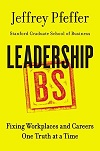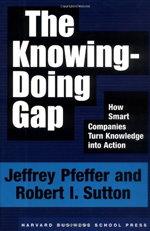Jeffrey Pfeffer Speaker Biography
Author, Well-Known Leadership Expert and
Professor of Organizational Behavior
Jeffrey Pfeffer is the Thomas D. Dee II Professor of Organizational Behavior at the Graduate School of Business, Stanford University where he has taught since 1979. He is a well-known author and expert on organizational behavior.
Books
Dr. Pfeffer is the author or co-author of 14 books including: The Human Equation: Building Profits by Putting People First, Power: Why Some People Have It—and Others Don’t, The Knowing-Doing Gap: How Smart Companies Turn Knowledge Into Action, Hard Facts, Dangerous Half-Truths, and Total Nonsense: Profiting from Evidence-Based Management, and more than 150 articles and book chapters. Pfeffer’s latest book, entitled Leadership B.S.: Fixing Workplaces and Careers One Truth at a Time, was published in September, 2015, by HarperBusiness.
Academics
Dr. Pfeffer received his B.S. and M.S. degrees from Carnegie-Mellon University and his Ph.D. from Stanford. He began his career at the business school at the University of Illinois and then taught at the University of California, Berkeley. Pfeffer has been a visiting professor at the Harvard Business School, Singapore Management University, London Business School, Copenhagen Business School, and for the past 10 years a visitor at IESE in Barcelona.
Media
Pfeffer currently writes a semi-monthly column for Fortune (Fortune.com). From 2003-2007, Pfeffer wrote a monthly column, “The Human Factor,” for the 600,000-person circulation business magazine, Business 2.0 and from 2007-2010, he wrote a monthly column providing career advice for Capital, a leading business and economics magazine in Turkey. Pfeffer also has been a regular blogger for the Corner Office section of BNET (CBS Interactive), and for the Harvard Business Review website, Bloomberg Business Week online, Inc., Time, and for the “On Leadership” section of The Washington Post. Pfeffer has appeared in segments on CBS Sunday Morning, 60 Minutes, and CNBC as well as television and radio programs in Korea and Japan and has been quoted and featured in news articles from countries around the globe.
Affiliations
Pfeffer currently serves on the board of directors of Berlin Packaging and the nonprofit Quantum Leap Healthcare, and on the advisory board for Collective Health. In the past he has served on the boards of Resumix, Unicru, and Workstream, all human capital software companies, Audible Magic, an internet company, SonoSite, a company designing and manufacturing portable ultrasound machines, and the San Francisco Playhouse, a non-profit theater.
Keynote Speaker
Pfeffer has presented seminars in 39 countries throughout the world as well as doing consulting and providing executive education for numerous companies, associations, and universities in the United States.
Awards and Accolades
Jeffrey Pfeffer has won the Richard D. Irwin Award presented by the Academy of Management for scholarly contributions to management and numerous awards for his articles and books. He is listed in the top 25 management thinkers by Thinkers 50, and as one of the Most Influential HR International Thinkers by HR Magazine. In November, 2011, he was presented with an honorary doctorate degree from Tilburg University in The Netherlands.
Jeffrey Pfeffer Speaking Topics
Leadership B.S.: Fixing Workplaces and Careers One Truth at a Time
For literally decades the world has seen books, blogs, Ted talks, executive development efforts, conferences, and similar activities—some estimates place the size of the leadership education and development budget in the U.S. at $20 billion annually. Nonetheless, almost every piece of evidence—on job satisfaction, trust in leaders, employee engagement, leadership success, the efficacy of leadership development efforts—shows persistent failure and problems with leader tenures getting shorter and things getting worse. Why? And more importantly, what might organizations do to fix the ongoing crises in leadership? This book takes on the simplistic nostrums that have beset the leadership industry and offers evidence-based, practical suggestions for enhancing both personal and organizational success.
Dying for a paycheck: Social sustainability at work
Even as companies bemoan high health care costs and the productivity lost from sick and absent workers, and even as employers institute policies to encourage their employees to practice healthier lifestyles, many work organizations have management practices that sicken and kill people and drive up health care costs in the process. Stefanos Zenios, Joel Goh, and I estimate that there are more than 120,000 excess deaths and that 10% of health care spending in the U.S. result comes from management actions that harm people’s well-being and do not positively affect organizational performance. One important reason why per capita health care costs are higher in the U.S. than in other countries with no better—and in many instances worse—health outcomes is because of differences in the prevalence and cost of harmful management practices. Just as organizations increasingly focus on environmental sustainability as part of their employee and customer branding, to be socially responsible, and to save on the economic costs of waste and pollution, there are things employers can and should do to enhance human sustainability and cut down on social pollution, waste, and excess costs.
Turning knowledge into action and getting things done: overcoming the knowing-doing gap
Organizations know what they need to do in domains ranging from talent management to employee engagement to M & A integration but often don't do it. Companies have spent millions of dollars building intranets and collaborative tools to capture and share knowledge, under the assumption that in a world in which intellectual capital is increasingly important, the company with the best knowledge management system wins. The underlying assumption is right—intellectual capital and knowledge work are increasingly important. But knowledge that isn’t turned into action is about as bad as action that is not informed by knowledge. Our research has uncovered some important barriers to using and implementing knowledge and building a culture of action instead of just talk and analysis. We have found examples and uncovered strategies and tools for overcoming the knowing-doing gap to build a culture of implementation. And there are a set of management practices that can create a company that learns from its experience and turns that learning into actions and results.
Building high performance organizations and cultures
The data are clear: success does not come from mergers and consolidations to increase size, from being in high technology, from being in the “right” industry, or even from being first to market with an idea—after all, Xerox invented the first personal computer, Lipitor (from Pfizer) was the third statin drug to hit the market, Diner’s Club predated Visa (credit cards) by decades, and Amazon was at least the fourth company to begin selling books on line. Studies of companies in numerous industries ranging from automobile manufacturing to semiconductors, studies of companies in multiple industries, and research in countries including the United Kingdom, Korea, Japan, Spain, and Germany demonstrate the strong correlation between how companies manage their people and their profits, productivity, and customer and employee retention. Our research has identified the essential elements of high performance or high-commitment work arrangements, why these practices are effective, and what this means for building management systems and organizational culture.
The paths to power
Although power is a word that sometimes has negative connotations, building power and influence is what effective leaders do and is essential to getting things done. Moreover, building skills in managing organizational dynamics is what distinguishes people who suffer derailments and those that have successful careers. Over decades of research, we have uncovered what are effective ways of building and exercising influence, and some of the dilemmas and choices people face as they move through their careers in organizations. It is possible to answer questions such as: 1) when is power and influence more important for getting things done (it turns out that team-oriented, more collegial environments actually make influence skills more, rather than less important); 2) what are the individual attributes associated with being influential, and how can these be developed; 3) what are some effective strategies and tactics for obtaining and using power; 4) how can you develop allies and supporters; 5) how do you build social networks that are both efficient and effective, 6) how can you deal effectively with opposition and with difficult opponents; 7) how can you more effectively speak and act with power and why is it important to do so, and 8) what are some pitfalls to those in positions of power, and how can these be avoided? Our educational work helps people develop their clinical, observational skills, their ability to analyze and exercise influence effectively, and to think constructively about power and its use in getting things done in organizations of all sizes and types.
Managing in tough times: What companies have done right, and mostly wrong
The most typical response to the difficult economic environment of the past few years has been to cut costs and retrench. There have been layoffs, cutbacks in new product and new expansion initiatives, and attempts to outsource more and more activities. But these moves have seldom considered what their feedback effects will be. A few companies have recognized that tough times present the best opportunity to gain ground on the competition, and have behaved accordingly. What lessons can we draw from their actions?
Jeffrey Pfeffer Books

Leadership BS: Fixing Workplaces and Careers One Truth at a Time
Purchase Book
Hidden Value How Great Companies Achieve Extraordinary Results with Ordinary People
Purchase Book
The Knowing-Doing Gap: How Smart Companies Turn Knowledge into Action
Purchase Book
The Human Equation: Building Profits by Putting People First
Purchase Book
Power: Why Some People Have It and Others Don’t
Purchase Book
What Were They Thinking?: Unconventional Wisdom About Management
Purchase Book





